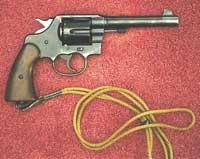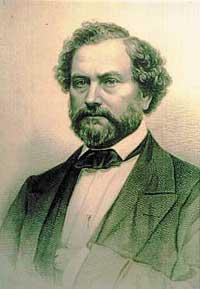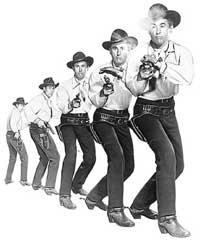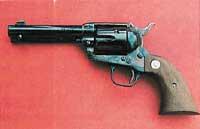A man enriched by the deaths

With just seven years, his parents discovered he was dismantling and mounting a pistol. Three years later, the young Colt explained to the inhabitants of the whole village his new innovative torpedo. He told them he would blow up the lake raft near the village. Say and do it! Its inhabitants could see the raft above the sky of Hartford. The explosion was very strong: it left the spectator full of water and mud. Angry and angry, all the people tried to catch the young inventor, but Elisha K. It was sponsored by engineer Root.
What prompted Samuel Colt?

In 1830, Samuel's father sent his son to the ship called Corvo. He liked the danger and thought that trip would reassure his son a little. But to the detriment of his father and many others, his son kept his imagination and his passion for adventure. At sea,
in his free hours, he tried to carry out the idea he carried on his head the way he could: he carved a simple wooden cylinder, an axis and a hammer. According to legend, these three pieces were created inspired by the components of the boat: imitating the trench used to hold the rudder, anchor and anchor. As soon as you get home it was made with more suitable materials.
Samuel Colt was not the first inventor of the revolver. By then there were already rotary drum weapons and multiremolios. But Samuel Colt perfected the revolver by getting the drum of this instrument to spin automatically. After all, he made the tool he intended to kill more useful.
Reputation of colt revolvers

In 1836-1842 Colt industrially produced his first weapons. The patent for the new device was temporarily transferred to the Patent Arms Manufacturing Company in New Jersey. For several reasons (for not getting a good contract with the government, for the bad development of weapons…) Colti went wrong and failed. However, he continued to work and had the opportunity to carry out other inventions such as submarine mines to protect ports, electric transport cable and telegraph signals.
As is known, weapons have always been and remain a source of income. That is why Samuel continued to perfect the revolver. In 1846 he was visited by American captain Samuel Walker. The relationship between the two men triggered the famous revolver Colt-Walker. Thanks to this weapon, and thanks to the contract he signed with the government to produce in large quantity that model of revolver, Colt fulfilled his childhood dream of opening his own weapons factory.
Wide variety of weapon models

The first model that emerged after the walker was the series Dragoons: The small revolver models Baby Dragoon and Pocket (1849), as well as the model Navy (1851) that triumphed. Years later, the Civil War began in the United States. This fact enriched Samuel Colt. In their company they worked day and night so that all the soldiers had at least one weapon in their hands.
In 1862, at age 47, Colt died of health problems. Elizabeth Jarvis' widow continued to sell that poisonous tool that Samuel created with great passion.
On the other hand, in 1911, thanks to the 45ACP caliber pistol, the Colt revolvers factory became the most prestigious company in the United States. And that year the US government accepted this model of pistol as a regulatory weapon. In addition, in the 1960s, the Colt company created the famous AR-15/M-16 rifle, especially for the Vietnam War.
Revolver separator of good and bad

During the first 67 years of the creation of the model SAA (Single Action Army) was used by vendors, explorers, soldiers, police, projes, baserritarras... But in the early 1970s it was also possible to see it in the hands of film actors.
What would cowboys John Wayne, Gene Autry and Roy Rogers be in the hand without a revolver? It would be like explaining Charlie Chaplin without his cane. John Wayne, for example, used in most films a revolver model called Peacemaker. In the western countries, some models of revolver were always used by good heroes and protagonists (models of revolver Peacemaker and SAA) and others by bad. Surprisingly, the killing instruments also serve to distinguish honest and malevolent. But are the revolvers in the hands of so many human beings beneficial? Unfortunately, Elhuyar has not had the opportunity to raise this question to Samuel Colti.





